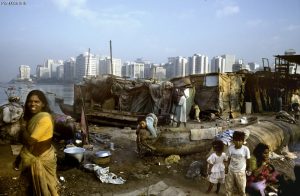Inequalities
Volume 23, Issue 2, July 2015

Shanty homes of fisher families and city immigrants on Back Bay, with tower blocks of Nariman Point in the background – Mumbai, India 2004. Credit: Paul Smith/Panos
Patterns of poverty and inequality are changing, and challenging the ways we understand development. Today’s increasing polarisation between rich and poor in middle-income and high-income countries highlights the flaw in the notion that economic growth heralds ‘progress’ and ‘development’ for humanity. The articles in this issue of G&D, from a wide range of voices in international development research, policy and practice, offer a gendered perspective on inequalities. The very pervasiveness of gender inequality, and the way it intensifies other forms of inequality, demands that policymakers should focus on it as a central concern when considering issues of poverty and inequality, and when thinking of development not just in terms of GDP, but as social justice and economic well-being for all.
Contents
Gender & Development is an Oxfam journal, published by Routledge. If you are interested in subscribing to the journal, please visit the Routledge website. (Please note the reduced subscription rates available for low and middle-income countries.)
For free access to individual articles from the Inequalities issue, please visit our page on the Oxfam Policy & Practice website, and search the site using the article title or author name.
You can access the Introduction, a selection of articles, and the Resources Section from the Inequalities issue, free, below.
Editorial
Introduction: Gender and Inequalities
Naila Kabeer and Caroline Sweetman
Articles
Gender, poverty and inequality: a brief history of feminist contributions in the field of international development
Naila Kabeer
Gendering the inequality debate
Diane Perrons
The Individual Deprivation Measure: measuring poverty as if gender and inequality matter
Sharon Bessell
Gender inequality and inter-household economic inequality in emerging economies: exploring the relationship
Daria Ukhova
‘Leave no-one behind’ and the challenge of intersectionality: Christian Aid’s experience of working with single and Dalit women in India
Jayshree P. Mangubhai and Chiara Capraro
Women’s economic inequality and domestic violence: exploring the links and empowering women
Christine Hughes, Mara Bolis, Rebecca Fries and Stephanie Finigan
The food insecurity – obesity paradox as a vicious cycle for women: inequalities and health
Andrea S. Papan and Barbara Clow
Measuring the drivers of gender inequality and their impact on development: the role of discriminatory social institutions
Gaëlle Ferrant and Keiko Nowacka
Addressing multiple dimensions of gender inequality: the experience of the BRAC Gender Quality Action Learning (GQAL) programme in Bangladesh
Sheepa Hafiz, Mohammed Kamruzzaman and Hasne Ara Begum
Bridging inequalities through inclusion: womens’ rights organisations as the ‘missing link; in donor-led participatory policy development and practice
Abigail Hunt, Hannah Bond and Ruth Ojiambo Ochieng
Resources
Compiled by Liz Cooke
Views, events, and debates (subscriber-only access)
Edited by Liz Cooke
Book Reviews
Edited by Liz Cooke
The Search for Lasting Peace: Critical Perspectives on Gender-Responsive Human Security
Reviewed by Annick T. R. Wibben
Women, Gender and Everyday Social Transformation in India
Reviewed by Shalini Grover
Gender in World Perspective (3rd Edition)
Reviewed by Fenella Porter
Gender, Globalization and Health in a Latin American Context
Reviewed by Sarah Payne
Women and the Informal Economy in Africa: From the Margins to the Centre
Reviewed by Martha Chen
Globalized Fatherhood
Reviewed by Gary Barker
Women in Politics: Gender, Power and Development
Reviewed by Nidhi Tandon
